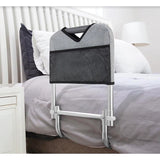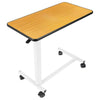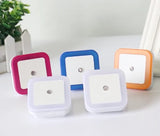Sleep plays a pivotal role in determining your daily well-being. Inadequate sleep can lead to increased imbalance and fatigue, making it crucial for home safety. We as human beings are a system. Sleep quality is pivotal in how you can function throughout the day, so let's talk about it!
In this article you'll learn:
- Why sleep quality is crucial for daily well-being
- How to use positioning to improve sleep.
- Tactics for using lighting to improve sleep quality
- How pre-sleep habits can impact your sleep quality
Why Sleep is So Important
Sleep plays a vital role in our daily functioning and overall longevity, acting as a cornerstone of our ability to age in place successfully. During sleep, our bodies undergo numerous restorative processes that are critical for physical health. This includes the repair of the heart and blood vessels, as well as the consolidation of memory and learning. A lack of adequate sleep has been linked to a higher risk of chronic health conditions such as heart disease, diabetes, and obesity. It's also linked to cognitive decline, which can complicate the aging process and diminish our capacity to live independently at home.
Getting great sleep also positively impacts our mental and emotional resilience, enabling better stress management, mood regulation, and decision-making. Functionally, that puts you at a lower risk for falls and a better ability to adhere to healthful routines. Prioritizing sleep isn't merely about preventing fatigue. It's about nurturing a foundation of health that supports aging with dignity and independence, protecting the ability to live at home for as long as possible.
Let's dive into some practical ways to improve sleep quality that you can change tonight!
Optimize Your Sleep Position
Comfort in one's sleeping environment isn't just a luxury— it's a necessity, especially when faced with challenges such as chronic pain, breathing difficulties, or acid reflux. Many people find lying flat not only uncomfortable but detrimental to their sleep quality and overall health. Incorporating a wedge pillow to elevate the head or legs can offer significant relief and improve sleep quality. For instance, a slight elevation of the head with a wedge pillow can alleviate symptoms of acid reflux, while elevating the legs can help reduce edema, enhancing comfort and promoting better sleep.
When there's a problem with using a bed, often the first thing my patients think about is getting a hospital bed. But they aren't always the best or most appropriate solution for everyone. While Medicare does cover the cost of hospital beds, it's

only for people with a select few diagnoses. So adjusting one's existing bed with affordable accessories can provide the functional benefits of a hospital bed while maintaining the comfort and aesthetics of your current bed. This includes:
- Bed rails for added safety
- Overbed table for convenience
- Air mattress toppers for pressure relief
- Adjustable bed bases for positioning

These adaptations allow individuals to customize their sleeping environment to their specific needs without sacrificing the sense of comfort and normalcy provided by their own bed.
Lighting Adjustments for Better Sleep
Dimming main lights before bedtime is a crucial practice for signaling to your body that it's time to wind down, preparing for a restful night's sleep. The installation of

motion-activated night lights can elegantly bridge the gap between full wakefulness and sleep readiness, providing just enough illumination to navigate safely to the bathroom without fully arousing the body from its pre-sleep state. Minimizing exposure to electronic devices in the hours leading up to bedtime is also key, as the blue light emitted from screens can significantly interfere with the body's natural sleep-wake cycle, delaying the release of melatonin, the hormone responsible for sleep. Instead, engaging in calming activities such as reading under a lamp with a warm color temperature can significantly enhance the body's readiness for sleep, fostering a serene transition to slumber.
Integrating features like blackout curtains or using eye masks can further enhance the sleeping environment, blocking out unwanted light and creating an ideal, darkened ambiance conducive to deep sleep. For auditory disturbances, consider incorporating white noise machines or apps that produce soothing sounds, masking background noise that might otherwise disrupt sleep. These adaptations not only aid in initiating sleep but also in maintaining uninterrupted sleep cycles, crucial for physical repair and cognitive processing.
Pre-Sleep Rituals for Enhanced Sleep Quality
Cultivating positive pre-sleep habits is essential for enhancing sleep quality and overall well-being. Engaging in a calming routine before bed, such as reading under a warm light, practicing meditation, or gentle stretching, can significantly ease the transition into sleep. Maintaining a consistent sleep schedule, reducing caffeine intake in the evening can further promote restful sleep.
By creating a bedtime ritual that includes these practices, individuals can significantly improve their sleep quality, which in turn supports daily function, emotional well-being, and longevity. This holistic approach to preparing for sleep underscores the importance of sleep hygiene in the broader context of aging in place, making sure individuals have the restorative rest needed to thrive in their preferred living environment.







